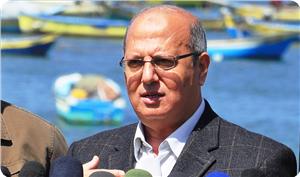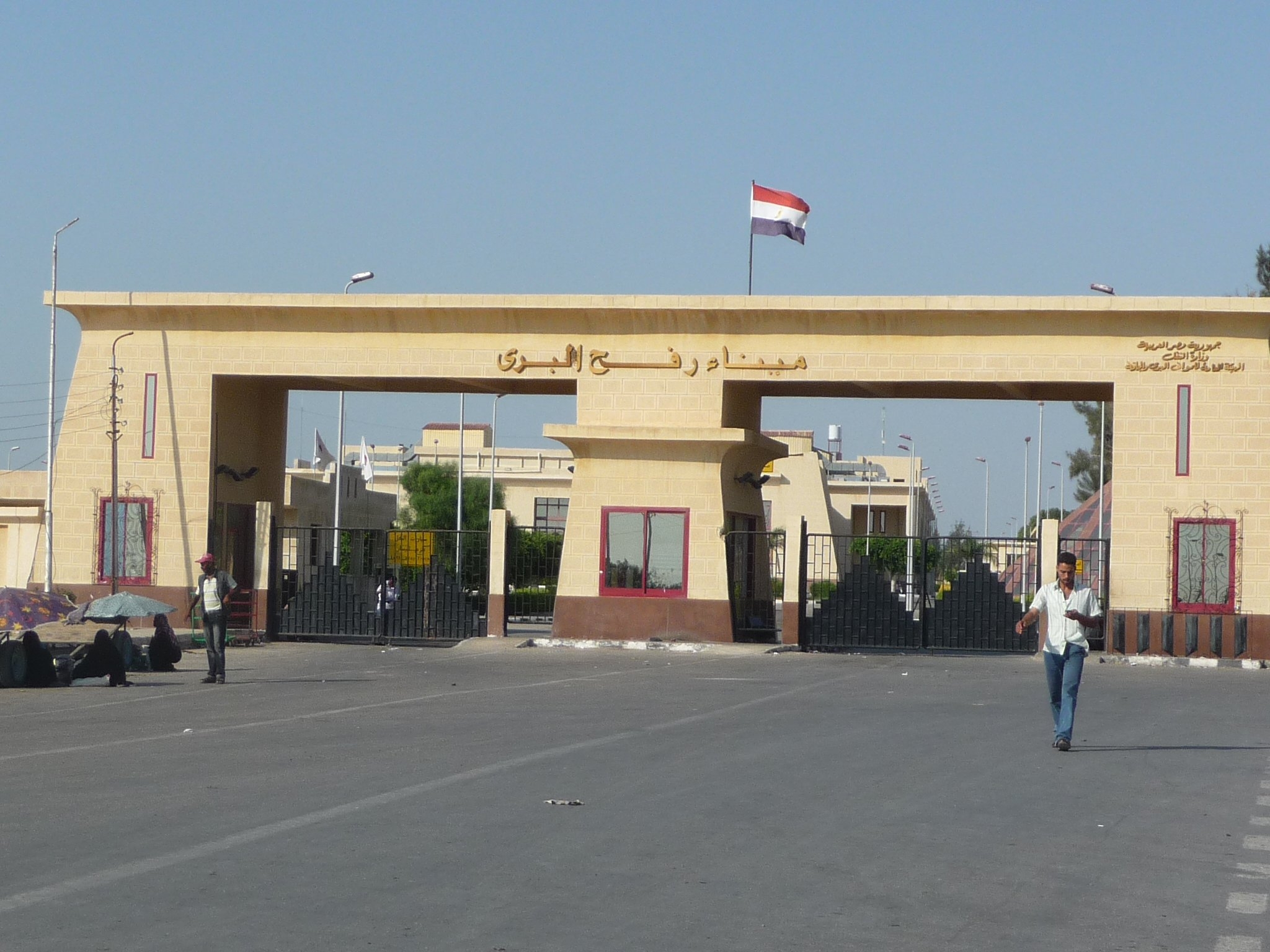www.aljazeerah.info
News, May 2014
Archives
Mission & Name
Conflict Terminology
Editorials
Gaza Holocaust
Gulf War
Isdood
Islam
News
News Photos
Opinion Editorials
US Foreign Policy (Dr. El-Najjar's Articles)
www.aljazeerah.info
|
Editorial Note: The following news reports are summaries from original sources. They may also include corrections of Arabic names and political terminology. Comments are in parentheses. |
Israeli Siege of Gaza, Closure of Egyptian Rafah Border Crossing Renders 1.7 Million Palestinians in the largest Prison in the World
 |
 |
| Jamal al-Khudari | Egyptian side of the Rafah border crossing with Gaza |
Khudari: Series of national and int’l events against Gaza siege to be held
[ 11/05/2014 - 04:42 PM ]
GAZA, (PIC)--
MP Jamal al-Khudari, head of the popular committee against the siege, announced the forthcoming initiation of a series of popular and institutional events so as to demand lifting the siege imposed on the Gaza Strip.
Khudari said in a press conference the events coincide with the fourth anniversary of the Freedom Flotilla, attacked by Israeli navy in international waters during which 9 volunteers on board were killed while more than 26 others were left wounded.
The conference included “a signature campaign” for the urgent lifting of the siege.
Khudari further confirmed the need to hold these events and activities simultaneously in different Arab, Islamic and foreign countries under the slogan "Freedom for Gaza and Palestine."
The signed petition will be submitted to the UN Secretary-General Ban Ki-moon, the permanent members of the Security Council, the European Union and Parliament, Secretary General of the Arab League Dr. Nabil Al Araby, and the Secretary General of the Organization of Islamic Cooperation Iyad Madani.
According to Khudari, Israeli Judaization schemes set against Occupied Jerusalem, the West Bank settlement and wall policies, along with the displacement of the 48 occupied Palestine natives, have all been, literally and metaphorically, part of the Israeli siege policy directly embodied in the Gaza Strip blockade.
The daily average per capita income in the Gaza Strip is estimated at 3% only of the Israeli daily per capita income, with 75 dollars a month for Gazans as opposed to 2,500 dollars for Israelis, almost 33 times higher. Khudari drew attention to the need to open all Gaza commercial crossings and a passageway connecting Gaza and West Bank, along with the reconstruction of the Gaza International Airport and the building of the Gaza seaport.
Khudari further called on for the need to allow all supplies, including building materials with no predetermined restriction lists, smooth access out of and into the Gaza Strip.
The Rafah Crossing: Gaza's gate to the world
Middle East Monitor, Ahmad Fahmi Monday, 03 March 2014 14:08
The Egyptian controlled Rafah border crossing, which is located in the southern Gaza Strip, links Gaza with the outside world. The Palestinians of the tiny impoverished enclave are denied their right to freedom of movement into and out of Gaza.
Gaza's population of 1.8 million can only use Cairo International Airport to fly to other countries.
Endless protests and sit-in's have been held by Gazans in recent months, calling on Egyptian authorities to keep it open permanently 24/7. The peaceful protestors have also called on all concerned parties such as the Palestinian Authority that has a good relationship with the new Egyptian regime to intervene in order to spare the people of Gaza any more suffering.
Thousands of people, including students and patients, as well as people who hold visas and citizenships to other countries, have been stranded for months waiting for the crossing to open.
The prolonged closure has affected people from different political affiliations. Everyone in Gaza has one demand; the full reopening of the Rafah crossing permanently and unconditionally and to be treated with dignity.
According to the Gaza Ministry of the Interior, the crossing was opened for only nine days since the start of 2014.
Since the ouster of Egypt's first elected president, Mohamed Morsi by the military led by Field Marshal Abdel Fattah Al-Sisi on July 3, Egyptian authorities closed the crossing until further notice for security reasons, after the Egyptian army started a crackdown against militants in the Sinai Peninsula, accusing the Hamas-ruled Gaza of taking part in attacks against Egyptian forces.
Last September, hundreds of students demonstrated near the crossing, in response, Egyptian authorities agreed to open it on September 18 and 19 for four hours each day for "emergency cases only", of course that did not address the needs of the 500-plus medical cases, let alone the 6,000 humanitarian cases, students, business people and workers waiting, some for several weeks if not months, to get out of Gaza.
But in many occasions, Egyptian border officials justified the closure saying that the computer network at the crossing had broken down. This triggered outrage among Gazans, especially students who demonstrated at the Palestinian side of the crossing and offered their laptops for free, in a sign of rejection of this excuse.
Gazans are depressed; they are detained, humiliated and violated because their right to travel freely has been stripped from them.
The Rafah crossing, the only access point for the Gaza Strip which has not been closed off by Israel, has always been the gate through which Gazans access the outside world since 1967.
Israel has occupied the Gaza Strip, West Bank and East Jerusalem in 1967 and even before the Israeli unilateral disengagement from Gaza in September 2005, the Rafah crossing was the main access point to the outside world for the vast majority of Gaza residents.
Egypt controls the Egyptian side of the crossing, and since late 2005 the Palestinians have been in control of the Palestinian side of the crossing, after Israel withdrew its forces and the Jewish settlers from the Gaza Strip.
Being denied the right to freedom of movement for so many years, the 1.8 million people who live in the 360 square kilometres strip are victims of Israel's prolonged military occupation and the political disagreements between the governments representing the two main rival Palestinian factions Fatah and Hamas and the new Egyptian military regime.
Human rights groups say Israel remains the occupying power in Gaza through controlling Gaza's airspace, territorial waters and land crossings, especially the Erez pedestrian terminal that links Gaza with the occupied West Bank.
Prior to 1967, under an Egyptian administration, the Gaza Strip had no controlled borders with Egypt and Gazans were able to drive through Sinai up to the Suez Canal without being stopped.
Human rights groups and activists say that the new restrictions imposed on Gazans by the new Egyptian regime are a form of collective punishment.
The Gaza Strip has been besieged since 2006 when Hamas won the January elections. The Mubarak regime was directly complicit in Israel's crimes against the Palestinians of Gaza. Unfortunately, this system of oppression has not come to an end even after the Muslim Brotherhood was elected in Egypt.
The situation has worsened since the military coup. Now the Palestinians of Gaza are being punished because the Muslim Brotherhood rules the Gaza Strip.
Humiliation Journey in Cairo
Ordinary Palestinians, especially men, are subjected to a humiliation procedure upon landing at Cairo International Airport; they are normally taken to a small detention room at the airport in very poor condition and bad facilities.
The harassment and deportation policy at Egyptian airports and crossings happen despite having the right entry visa to Egypt, even if Gazan travelers are on transit to and from Gaza.
This treatment is not applied for Gazans who have foreign passports. Some passengers, who have contacts within the Egyptian intelligence services, are exempt from this treatment if they apply for what is called "security coordination". This enables them to enter Egypt and leave the airport without problems and make their own way to Gaza when they want.
Most Gazans with Palestinian passports who arrive in Cairo are deported directly to Rafah in case the Rafah crossing is open.
Normally the deportation journey from Cairo airport to the Rafah crossing takes place in the morning at around 8am; a trip can take up to seven hours by with only one stop during the journey. In some cases, Gazans living or staying abroad wishing to go back to Gaza via Cairo airport will not be allowed to board the plane if the crossing is closed. Sometimes those who reach Cairo airport are sent back to the countries from which they set off.
Therefore, currently any Palestinian from Gaza who is outside Gaza or Egypt and wishes to return has to wait until the crossing is open. This will make tickets costly due to the uncertainty of the timing and last minute updates regarding opening times and dates.
Leaving Gaza to Cairo if Rafah was open
Those who are allowed to leave Gaza via Rafah without being deported or escorted by Egyptian security in order to catch their flights, make their own way to Cairo, but the majority nowadays are deported directly to Cairo, this procedure is intended to make sure that none of these passengers stays in Egypt.
When they arrive at Cairo airport, they are taken to the deportation room; their passports are taken from them. Passports are returned only when they are allowed to leave the room an hour prior to their flights.
Whilst the Egyptian closure of the Rafah crossing has exacerbated the existing situation, the fundamental issue to be tackled is the Israeli siege on Gaza, strengthened to a strangling point in mid-2007.
In light of the silence on part of the international community, it remains to be seen if the people of Gaza will ever have a chance to live normal lives, especially as they are denied their right to move freely to and from Gaza and import and export goods without restrictions. Relations with Egypt are critical to Gaza. Gaza shares a border with Egypt and shares important cultural ties with its larger neighbour. Gaza residents hope Egypt's policy of border closures will end one day, as Israel's ongoing seven-year siege has negatively affected all aspects of life and reduced Gazans to live in abnormal situations in what is commonly known as "the world's largest open air prison".
Fair Use Notice
This site contains copyrighted material the
use of which has not always been specifically authorized by the copyright
owner. We are making such material available in our efforts to advance
understanding of environmental, political, human rights, economic,
democracy, scientific, and social justice issues, etc. We believe this
constitutes a 'fair use' of any such copyrighted material as provided for
in section 107 of the US Copyright Law. In accordance with Title 17 U.S.C.
Section 107, the material on this site is
distributed without profit to those
who have expressed a prior interest in receiving the included information
for research and educational purposes. For more information go to: http://www.law.cornell.edu/uscode/17/107.shtml.
If you wish to use copyrighted material from this site for purposes of
your own that go beyond 'fair use', you must obtain permission from the
copyright owner.
|
|
|
|
||
|
||||||


